“If there the offensive develops to be a ground invasion, the Yemenis will prove that their country is the invaders’ graveyard,” (Sayyed Abdul-Malik Al-Houthi)
On Wednesday (25 Mar. 2015), Saudi Arabia announced a launch of a military operation against the Houthis, who currently control large parts of Yemen, including the capital Sanaa. Saudi attack is targeting Shiite Houthi rebels who are embroiled in a vicious civil war with the majority-Sunni-run Yemeni Government. Houthi militants have reportedly captured large stocks of weaponry from Yemen military sites. Saudi Arabia has reportedly deployed 100 fighter aircraft and 150,000 troops for the operation, Saudi allies have promised at least 100 fighter aircrafts more and U.S. logistical and intelligence support.
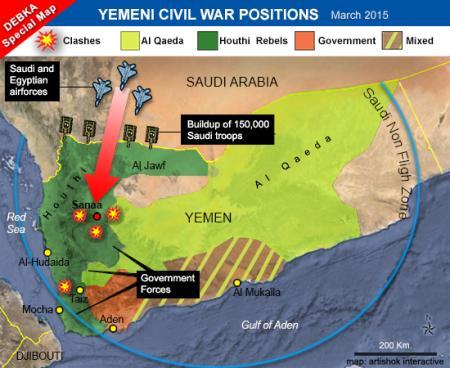
The blatant invasion of Yemen’s sovereignty by the Saudi government comes against a backdrop of total silence on the part of international bodies, especially the United Nations. The world body has so far failed to show any reaction whatsoever to the violation of the sovereignty of one of its members by Riyadh. Yemen is the last example about the hypocrisy of Western powers especially if the case is compared to reactions related to Ukraine.
Background
Yemen has a population some 25 million and, located at the tip of the Arabian Peninsula , bordered by Saudi Arabia to the north, Oman to the east, Red Sea to the west and Gulf of Aden to the south. The Republic of Yemen was created in 1990 when North and South Yemen united. 53% of the Muslim population is Sunni and 47% is Shi’a. Among Yemen’s natural and cultural attractions are four World Heritage sites.
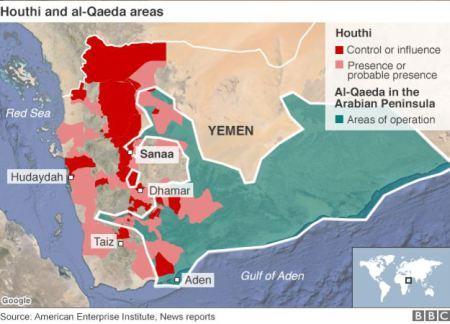 Instability and large-scale displacement, as well as weak governance, corruption, resource depletion and poor infrastructure, have hindered development in the poorest country in the Middle East. Yemen is the poorest country in the Middle East.
Instability and large-scale displacement, as well as weak governance, corruption, resource depletion and poor infrastructure, have hindered development in the poorest country in the Middle East. Yemen is the poorest country in the Middle East.
During last years in Yemen has been fighting between the state and the Houthis in the north; separatist unrest in the south; frequent attacks by al-Qaeda in the Arabian Peninsula (AQAP); and power struggles between tribal and military factions. By 2009, Saudi Arabia had joined the Yemeni army in attacking Saada – the Houthis’ stronghold – just across its southern border. In 2010 a joint Saudi-Yemeni military campaign was going on in the country’s war-weary north where Sana’a and Riyadh forces were engaged in a fierce fighting against the Houthi fighters.
The Houthis, who accused the Sunni-dominated Sana’a government of discrimination and repression against Yemen’s Shia minority, were the target of the army’s off and on attacks before the central government launched an all-out fighting against them in early August 2010. Same time Yemen’s southern provinces came the scene of U.S. air strikes which Washington claims to be aimed at uprooting an al-Qaeda cell operative in the Persian Gulf state. The political crisis in Yemen started in 2011 when Ali Abdullah Saleh, who ruled the country since 1978, finally signed away his presidency in favor of his Vice President Abd al-Rab Mansur al-Hadi, a fairly weak figure who lacked a significant support base, either in politics or the military.
In August 2014, Houthi rebels swept down from their stronghold in the mountains, demanding economic and political reforms. In September, they seized key state installations in Sanaa. The militants forced the country’s President Abd Rabbuh Mansur Hadi and his government to resign and dissolved the parliament in the first weeks of 2015. Hadi was under house arrest in Sanaa before he fled to Aden in February, quickly disavowing his resignation. Now Yemen’s fugitive President Hadi has arrived in the Saudi capital, Riyadh.
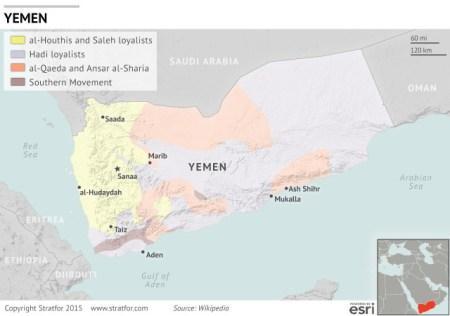
On 20th March 2015 suicide bombers attacked two mosques in Yemen’s capital, Sanaa, killing at least 126 people and wounding many others. Worshippers were attending noon prayers at the Badr and al-Hashoosh mosques when at least four attackers struck. The mosques are used mainly by supporters of the Zaidi Shia-led Houthi rebel movement, which controls Sanaa. Islamic State (IS), which set up a branch in Yemen in November, said it was behind the attacks. Yemen is the base of al-Qaeda in the Arabian Peninsula (AQAP), a powerful offshoot of the jihadist militant group that has carried out similar suicide attacks on Houthi supporters. However, now it seems that IS is also gaining ground in the country. Houthi militia members seized the military airport in Taiz on March 22 without any resistance from Yemeni military forces. Taiz is the third largest city located in the heart of Yemen and the gateway to south Yemen and Aden. (Source: Al-Monitor )
The local players
Yemen is home to what Western intelligence analysts consider to be the most dangerous franchise of al-Qaeda. AQAP stands for al-Qaeda in the Arabian Peninsula, an alliance formed in 2009 between violent Yemeni and Saudi Islamists. In 2000 al-Qaeda suicide bombers rammed a boat full of explosives into a billion-dollar destroyer, the USS Cole, killing 17 sailors. Today the danger of AQAP is based to its international reach. For example it is claimed AQAP to be behind the attack on the offices of satirical magazine Charlie Hebdo in Paris. Earlier AQAP has successfully smuggled viable bombs onboard aircraft on international flights (e.g. cases of sc. “underpants bomber” and smuggled bombs hidden in printer ink toner cartridges on US-bound cargo planes).
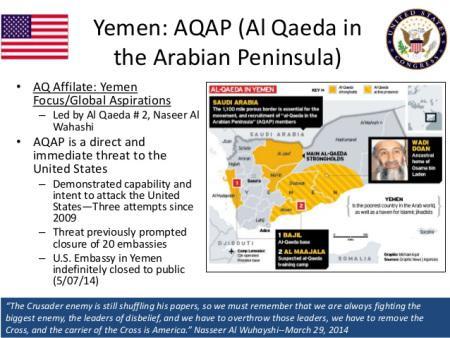
The Houthis are members of a rebel group, also known as Ansar Allah (Partisans of God), who adhere to a branch of Shia Islam known as Zaidism. Houthis are a large religious group comprising about one-third the population of Yemen and they ruled North Yemen under a system known as the imamate for almost 1,000 years until 1962. The Houthis are also benefiting from increasingly overt support from forces loyal to former President Ali Abdullah Saleh, who still has influence in the Yemeni military.
Islamic State (IS), which set up a branch in Yemen in November and is also gaining ground in the country.
U.S. involvement
For U.S. Yemen is important for two energy related issues: one is Yemen’s geopolitical location as one of the world’s most important oil transport routes and the other is undeveloped – some say one of the world’s largest – petroleum reserves in the territory. The U.S. Government Energy Information Agency states that “closure of the Bab el-Mandab could keep tankers from the Persian Gulf from reaching the Suez Canal/Sumed pipeline complex, diverting them around the southern tip of Africa. The Strait of Bab el-Mandab is a chokepoint between the horn of Africa and the Middle East, and a strategic link between the Mediterranean Sea and Indian Ocean.” In addition to its geopolitical position as a major global oil transit chokepoint, Yemen is reported to hold some of the world’s greatest untapped oil reserves.
The United States quietly opened already in 2008 largely covert front against Al Qaeda in Yemen. Citing an unnamed former top CIA official, the New York Times wrote that then Central Intelligence Agency sent many field operatives with counterterrorism experience to the country. At the same time, some of the most secretive special operations commandos have begun training Yemeni security forces in counter-terrorism tactics, the report said. The Pentagon will be spending more than 70 million dollars over the next 18 months, and using teams of special forces, to train and equip Yemeni military, Interior Ministry and coast guard forces, more than doubling previous military aid levels, the paper noted. Without doubt, the military-industrial complex has a stake in expanding areas to be exploited for oil as well as protecting U.S. oil sources. This is good news to the weapons industry.
There is similar U.S. involvement now in Yemen as it was earlier in Ukraine where various U.S. agencies had their role in Kiev’s coup d’etat. In Yemen e.g. USAID has funded a $3.58 million project to create a secession movement. Project was implemented mainly in Aden as south Yemen is strategically important for Western powers.
The US embassy last month closed its operations in Sanaa after the Houthis took command of the capital, leading to a situation where two rival governments in the north and south are competing for power.
Today U.S is officially backing Saudi attack to Yemen as one can note from White House statement :
In response to the deteriorating security situation, Saudi Arabia, Gulf Cooperation Council (GCC) members, and others will undertake military action to defend Saudi Arabia’s border and to protect Yemen’s legitimate government… The United States coordinates closely with Saudi Arabia and our GCC partners on issues related to their security and our shared interests. In support of GCC actions to defend against Houthi violence, President Obama has authorized the provision of logistical and intelligence support to GCC-led military operations. While U.S. forces are not taking direct military action in Yemen in support of this effort, we are establishing a Joint Planning Cell with Saudi Arabia to coordinate U.S. military and intelligence support.
Sayyed Abdul-Malik Al-Houthi, the leader of Yemen’s Ansarullah movement, said that the criminality and evil forces target all the Yemenis and their public facilities. In a televised speech, Sayyed Houthi asserted that the Saudi-US aggression on Yemen is unjustifiable, noting that the Saudi regime has always funded the plots which destabilze the regional countries. Sayyed Houthi considered that the offensive serves the Israeli and American interests. Saudi Arabia aimed at causing divisions in the various states in the region, yet the Yemeni people frustrated its plots and defeated its terrorist agents, according to Sayyed Houthi. Sayyed Houthi asserted that the Yemeni people relies on Holy God to face the Saudi-Led aggression, noting that Riyadh bets on the US role in the region. (Source: SyrianFreePress )
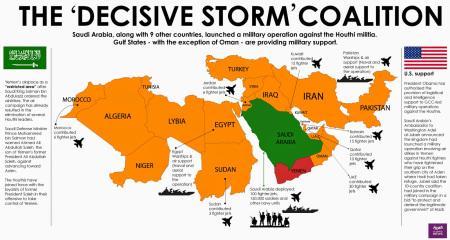
Regional battleground
Yemen is a battleground between Shiite-led Iran and Sunni-led Saudi Arabia. Houthi sources also reported they have been promised a year’s supply of crude oil from Iran and a new power plant. Direct air service between Tehran and Sanaa began in February. Islamic Revolutionary Guard Corps (IRGC) experts are advising the Houthi forces. Against this background, the success of the Houthis is seen as a blow to Saudi interests (and for that matter, American interests) and a boost for Iran. The Saudis also fear the Iranians with Iraqi help may try to stoke tensions and violence in Bahrain next.
In February 2015, a delegation of the Ansarullah movement visited the Russian capital, allegedly offering lucrative oil contracts and trade agreements, predominantly in agriculture. The delegation also included several political parties sympathetic to Ansarullah, including former President Ali Abdullah Saleh’s General People’s Congress. They promised to let Russian energy companies explore the oil-rich Marib province, which the parties said “they would likely control soon.” In reality, however, Russians view the current crisis in Yemen as systemic and long-standing. In this respect, Moscow is not disillusioned about the real prospects of its own presence in the country, economic or otherwise. (Source: Al-Monitor )
Summary: In the fact the Iran-Saudi Arabia proxy war is going on in Yemen.
My view
The irony now is that Yemen has went into a civil war pitting the Shia Houthis – suspected of being backed by Iran – against Sunni tribes backed by al-Qaeda and U.S. has in fact now forced to fight for al-Qaeda. If that doesn’t seem absurd enough so in Iraq, U.S. is helping Iranian-backed Shiite paramilitaries fight the Islamic State but in Yemen, U.S. is helping the Saudis fight Iranian-backed paramilitaries. Same time U.S. is at final stage to make deal with Iran about their nuclear program much to chagrin Saudi Arabia, the main U.S. ally in Arab world.
The foreign military intervention in Yemen is a clear-cut violation of international law, in particular of Article 2(4) of the United Nations Charter, which bans the use of force in relations between states. The unilateral action of Saudi Arabia and its allies is not in any way justified as act of “collective self-defence”. Instead it is interference in a civil war on the side of one party to the conflict, and it will make the domestic conflict even worse.
From my perspective Yemen is last example about hypocrisy displayed By Western powers. When U.S. backed coup ousted President Yanukovych it was praised as victory of democracy over corrupt society. When corrupt President Hadi was ousted in Yemen so West still suooorts him and even Saudi-led bombing against the people. One can only imagine what kind of outcry had followed if Russia had started bombing campaign against Kiev. So in the world of double standards only politics, money and power matters as usual.


